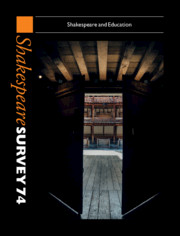Book contents
- Shakespeare Survey 74
- Shakespeare Survey
- Shakespeare Survey 74
- Copyright page
- Editor’s Note
- Contributors
- Contents
- Illustrations
- Whither Goest Thou, Public Shakespearian?
- Teaching Shakespeare in a Time of Hate
- Playful Pedagogy and Social Justice: Digital Embodiment in the Shakespeare Classroom
- Digital Resources, Teaching Online and Evolving International Pedagogic Practice
- Teaching Shakespeare with Performance Pedagogy in an Online Environment
- PPE for Shakespearians: Pandemic, Performance and Education
- ‘In India’: Shakespeare and Prison in Kolkata and Mysore
- Shakespeare for Cops
- Younger Generations and Empathic Communication: Learning to Feel in Another Language with Shakespeare at the Silvano Toti Globe Theatre in Rome
- Shakespeare in Nineteenth-Century Bengal: An Imperative of ‘New Learning’
- Forging a Republic of Letters: Shakespeare, Politics and a New University in Early Twentieth-Century Portugal
- Cultural Inclusivity and Student Shakespeare Performances in Late-Colonial Singapore, 1950–1959
- Using Performance to Strengthen the Higher Education Sector: Shakespeare in Twenty-First-Century Vietnam
- Counterpublic Shakespeares in the American Education Marketplace
- Taking Love’s Labour’s Lost Seriously
- The Thyestean Language of English Revenge Tragedy on the University and Popular Stages
- Going to School with(out) Shakespeare: Conversations with Edward’s Boys
- Intimacy and Schadenfreude in Reports of Problems in Early Modern Productions
- The True Tragedy as a Yorkist Play? Problems in Textual Transmission
- Henry VIII and Henry IX: Unlived Lives and Re-written Histories
- ‘And His Works in a Glass Case’: The Bard in the Garden and the Legacy of the Shakespeare Ladies Club
- Hamlet and John Austen’s Devil with a (Dis)pleasing Shape
- Shakespeare, #MeToo and his New Contemporaries
- ‘While Memory Holds a Seat in this Distracted Globe’: A Look Back at the Arden Shakespeare Third Series (1995–2020)
- Shakespeare Performances in England, 2020
- The Year’s Contribution to Shakespeare Studies
- ABSTRACTS OF ARTICLES IN SHAKESPEARE SURVEY 74
- Index
The Thyestean Language of English Revenge Tragedy on the University and Popular Stages
Published online by Cambridge University Press: 28 August 2021
- Shakespeare Survey 74
- Shakespeare Survey
- Shakespeare Survey 74
- Copyright page
- Editor’s Note
- Contributors
- Contents
- Illustrations
- Whither Goest Thou, Public Shakespearian?
- Teaching Shakespeare in a Time of Hate
- Playful Pedagogy and Social Justice: Digital Embodiment in the Shakespeare Classroom
- Digital Resources, Teaching Online and Evolving International Pedagogic Practice
- Teaching Shakespeare with Performance Pedagogy in an Online Environment
- PPE for Shakespearians: Pandemic, Performance and Education
- ‘In India’: Shakespeare and Prison in Kolkata and Mysore
- Shakespeare for Cops
- Younger Generations and Empathic Communication: Learning to Feel in Another Language with Shakespeare at the Silvano Toti Globe Theatre in Rome
- Shakespeare in Nineteenth-Century Bengal: An Imperative of ‘New Learning’
- Forging a Republic of Letters: Shakespeare, Politics and a New University in Early Twentieth-Century Portugal
- Cultural Inclusivity and Student Shakespeare Performances in Late-Colonial Singapore, 1950–1959
- Using Performance to Strengthen the Higher Education Sector: Shakespeare in Twenty-First-Century Vietnam
- Counterpublic Shakespeares in the American Education Marketplace
- Taking Love’s Labour’s Lost Seriously
- The Thyestean Language of English Revenge Tragedy on the University and Popular Stages
- Going to School with(out) Shakespeare: Conversations with Edward’s Boys
- Intimacy and Schadenfreude in Reports of Problems in Early Modern Productions
- The True Tragedy as a Yorkist Play? Problems in Textual Transmission
- Henry VIII and Henry IX: Unlived Lives and Re-written Histories
- ‘And His Works in a Glass Case’: The Bard in the Garden and the Legacy of the Shakespeare Ladies Club
- Hamlet and John Austen’s Devil with a (Dis)pleasing Shape
- Shakespeare, #MeToo and his New Contemporaries
- ‘While Memory Holds a Seat in this Distracted Globe’: A Look Back at the Arden Shakespeare Third Series (1995–2020)
- Shakespeare Performances in England, 2020
- The Year’s Contribution to Shakespeare Studies
- ABSTRACTS OF ARTICLES IN SHAKESPEARE SURVEY 74
- Index
Summary
In the London playhouses, the sound of Latin was a regular feature of the auditory experience, albeit in bitesize bursts. At the same time, although Latin was firmly entrenched at the universities as the language of academic drama, Oxford and Cambridge students did, on occasion, write plays in English. Running counter to what many early modern writers liked to claim, therefore, neither side had exclusive use of the language with which their production centre was associated: professional dramatists did not stick to English, and amateur dramatists at the universities did not stick to Latin. To understand English revenge tragedy, we must keep Latin in the picture and be open to the idea of multiple streams of influence running between the different production centres of Oxford, Cambridge and London. To this end, in this article I present a new way of viewing English revenge tragedy that allows us to embrace the corpus in all its variety. I show how, in the world of early modern drama in England, there exists a common language which transcends the choice of Latin or English: the Thyestean language, steeped in a tradition of ambition and one-upmanship.
- Type
- Chapter
- Information
- Shakespeare Survey 74Shakespeare and Education, pp. 222 - 237Publisher: Cambridge University PressPrint publication year: 2021

